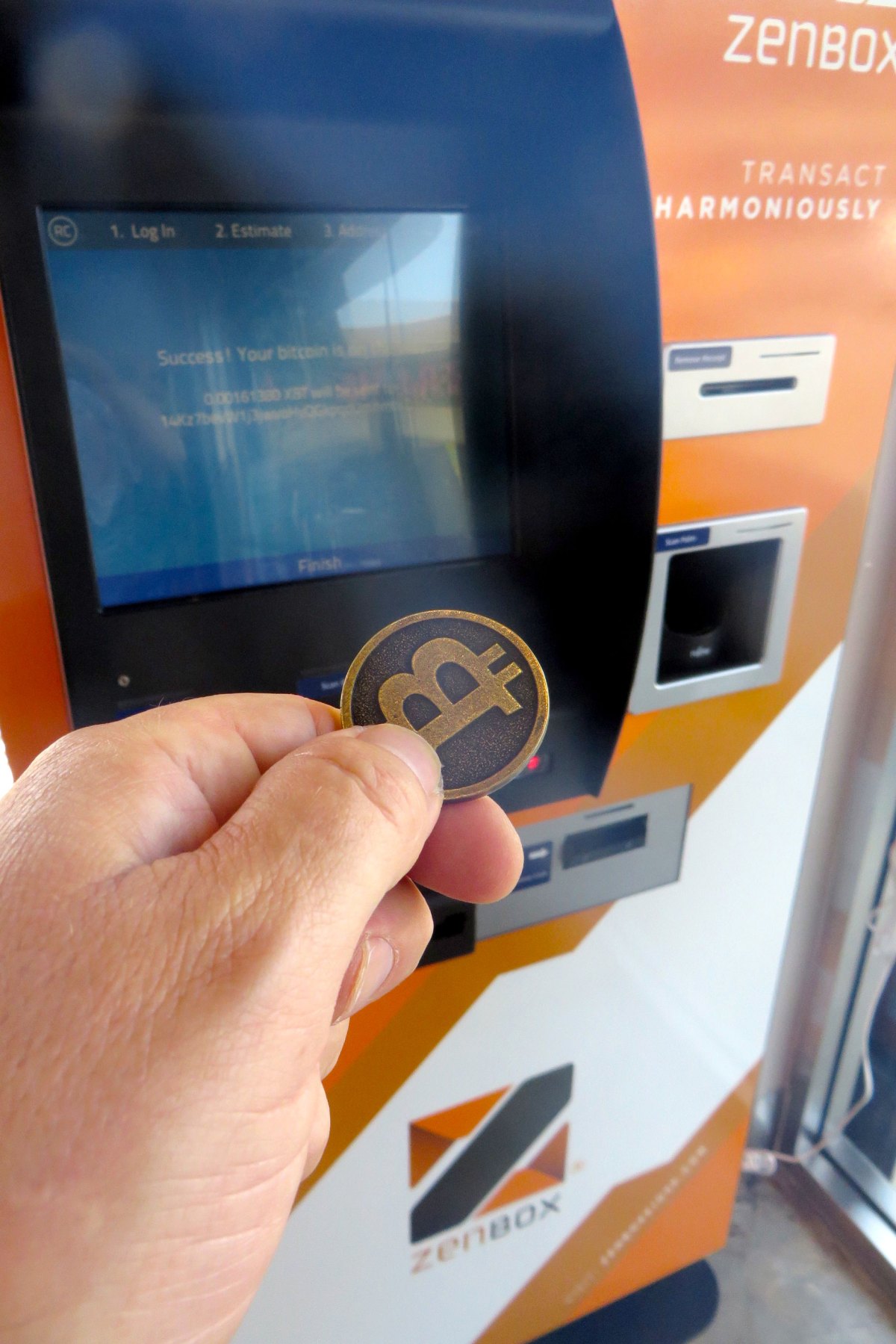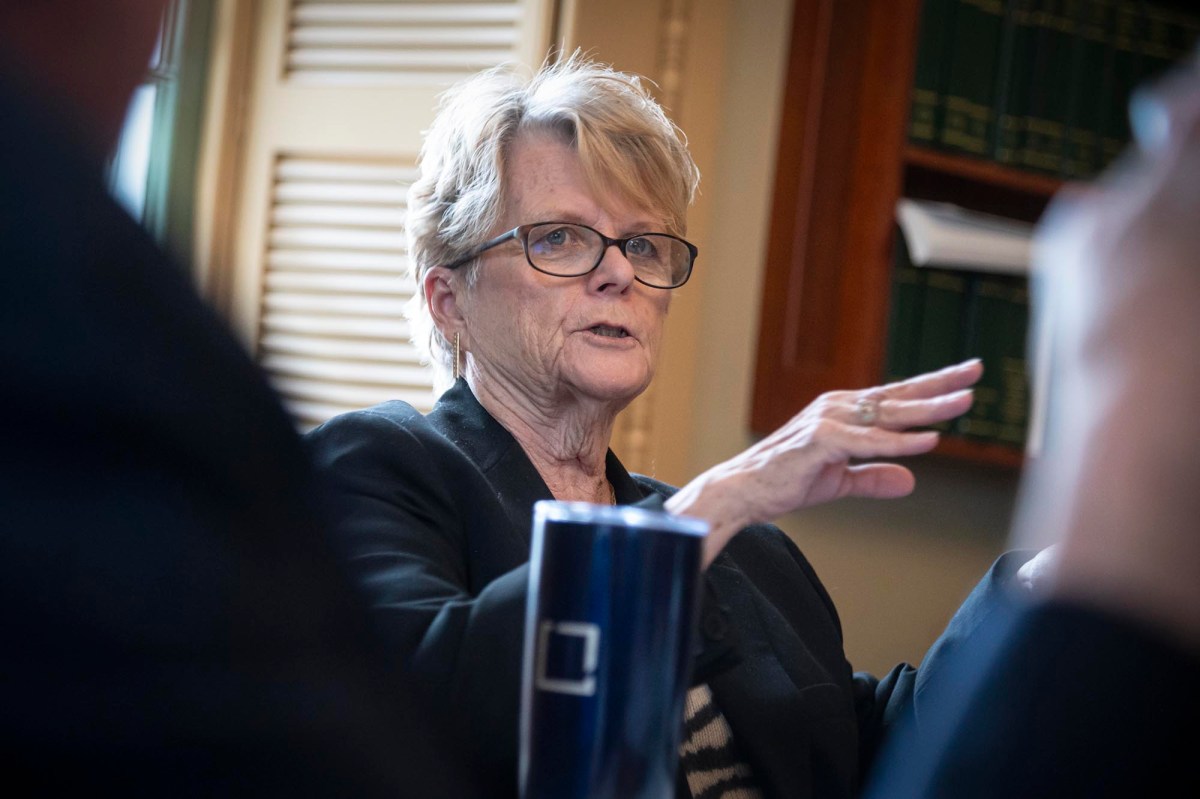Regulation
Lawmakers send new ‘Bitcoin ATM’ regulations to Gov. Phil Scott’s desk

A man uses a Bitcoin kiosk. Photo via Pexels
In an effort to protect Vermonters from scammers, lawmakers recently passed what could become the state’s first-ever law regulating cryptocurrency kiosks, which allow people to quickly purchase virtual currencies in cash or debit card.
 A person holds a physical Bitcoin in front of a kiosk. Photo by BTC keychain via Flickr
A person holds a physical Bitcoin in front of a kiosk. Photo by BTC keychain via Flickr
Among the provisions included in H.659 There is a daily transaction limit, a fee cap on exchanges and a one-year moratorium on the installation of any new machines in the state, which would take effect at the end of June.
Although Gov. Phil Scott has yet to see the final text of the bill, his spokesman Jason Maulucci said “the Department of Financial Regulation is comfortable” with its provisions.
Kiosks look like standard ATMs that allow consumers to connect to their banks from places like gas stations and bars, but they are actually very different. Instead, the machines sell “cryptocurrencies,” the nickname given to a wide range of digital currencies that don’t rely on banks to verify transactions.
There are currently 36 approved kiosks in Vermont, with seven more awaiting regulatory approval, according to the Department of Financial Regulation.
After exchanges of amendments between the two legislative chambers, the House passed the Senate’s version of the bill on April 25.
As of Monday morning, the governor had not yet received the bill but was expecting it shortly, Maulucci said. Once in his hands, Scott would have five days to sign it, veto it or let it pass without his signature.
When the House first passed H.659 in January, it was a routine measure, a updated Vermont captive insurance laws. However, within the Senate Finance Committee, a new section appeared called “Virtual Currency Kiosk Operators”, which introduced restrictions on the machines to prevent their use by fraudsters.
Sen. Ann Cummings, D-Montpelier, who chairs the committee, said lawmakers worked closely with the Department of Financial Regulation to find the right language. The Department warned of crypto scams several times in recent years.
“This is about protecting Vermonters’ savings,” Cummings said.
A vector of fraud
The difficulty of tracking both cryptocurrencies and cash has made “bitcoin ATMs” a powerful vector of fraud. If a scammer manages to convince a victim to exchange large sums of money for cryptocurrencies on one of these machines, there is no intermediary bank to freeze the transaction. Once the money is transferred to the fraudster’s virtual wallet, it is virtually impossible to get it back.
To prevent Vermonters from losing too much money at once, lawmakers included a $1,000 daily transaction limit in the bill.
“It’s about slowing the rate at which people are falling victim,” said Aaron Ferenc, deputy commissioner of banks at the Department of Financial Regulation.
The legislation would also impose a 3% cap on the fees kiosk operators can charge on each exchange.
In testimony to the House Commerce CommitteeRepresentatives for two Vermont kiosk operators argued that the regulations would effectively prevent them from operating in the state.
“Sometimes when you get to a very rural area, it’s more expensive to send an armed guard to collect the money,” said Larry Lipka, senior vice president of CoinFlip, which operates three kiosks in Vermont. He emphasized Californiawhere the fee limit is 15%, allowing businesses to recover more costs.
Mark Smalley, head of compliance at Bitcoin Depot, said the potential departure of kiosk operators would hurt small businesses. These companies pay rent for space to store their machines, usually in convenience stores or smoke shops.
Bitcoin Depot operates 23 staffed locations, which would not be subject to the new regulations, throughout Vermont. It also has three crypto kiosk registrations pending with the Department of Financial Regulation.
 Governor Phil Scott responds to a during his weekly press conference at the Statehouse in Montpelier on Wednesday, April 3, 2024. Photo by Glenn Russell/VTDigger
Governor Phil Scott responds to a during his weekly press conference at the Statehouse in Montpelier on Wednesday, April 3, 2024. Photo by Glenn Russell/VTDigger
During more than an hour of testimony, lawmakers grilled executives about whether their companies were doing enough to protect customers from fraud.
A significant portion of crypto kiosk users are: in CoinFlip’s own words“underbanked and low-income people who want to transact primarily in cash,” putting them at particular risk of losing their savings if they fall prey to a scam.
Lipka said CoinFlip’s kiosk screens warn of scams and ask users to call its 24/7 hotline if a third party has sent them there to make a transaction.
“Additionally, CoinFlip permanently blacklists high-risk digital wallet addresses to prevent them from being used again at a CoinFlip kiosk,” he said.
When Rep. Kirk White, D/P-Bethel, asked if bad actors could easily create new wallets to avoid the blacklist, Lipka admitted they could.
“Companies always say, ‘If you do this to us, we’ll go out of business,'” Cummings said when asked about the House testimony. “You have to look at the numbers and make the best decision possible.”
“We are not an ATM”
The biggest point of contention, however, concerned the very nature of crypto kiosks and their relationship to traditional ATMs – which is short for “automated teller machine.”
“You know, we call them ATMs because that’s what they look like and they make people feel comfortable,” Lipka said. “But we are not an ATM. You don’t have access to your own money. We are selling you something that you buy voluntarily. »
Rep. Heather Chase, D-Chester, appeared stunned by his comments.
“Did you just say you call them ATMs, not that they are, so people will be comfortable with that? ” she asked.
“We have (called them ATMs) in the past,” Lipka said. “We prefer crypto kiosks… because that’s what it actually is. It’s not an ATM because it’s not connected to a bank.”
On his website, CoinFlip bills itself as “a coast-to-coast Bitcoin ATM network.” A photo of CoinFlip physical machine on the company’s landing page includes the words “Bitcoin ATM” written prominently below the touchscreen.
However, the legislation could have been even harsher towards kiosk operators. The House amendment to H.659 would have banned all kiosks from operating for two years. The Senate reduced this measure to a one-year moratorium on the registration of new machines.
“We have people who have put their money in the kiosks, so there was concern that they wouldn’t be able to access their savings,” Cummings said.
 Sen. Ann Cummings, D-Washington, chairwoman of the Senate Finance Committee, speaks at the Statehouse in Montpelier on Tuesday, Jan. 30, 2024. Photo by Glenn Russell/VTDigger
Sen. Ann Cummings, D-Washington, chairwoman of the Senate Finance Committee, speaks at the Statehouse in Montpelier on Tuesday, Jan. 30, 2024. Photo by Glenn Russell/VTDigger
If the bill were to become law, the Commissioner of Financial Regulation would be required to report to lawmakers by January 2025 on whether the legislation does enough to protect Vermonters.
Cummings said the newness of cryptocurrency meant it took a while for lawmakers to get around to it.
“It’s a whole new world,” Cummings said. “We probably won’t get it right the first time.”
Related
Regulation
Crypto community gets involved in anti-government protests in Nigeria

Amid the #EndBadGovernanceInNigeria protests in Nigeria, a notable shift is occurring within the country’s cryptocurrency sector. As the general public demands sweeping governance reforms, crypto community leaders are seizing the opportunity to advocate for specific regulatory changes.
Rume Ophi, former secretary of the Blockchain Stakeholders Association of Nigeria (SiBAN), stressed the critical need to integrate crypto-focused demands into the broader agenda of the protests.
Ophi explained the dual benefit of such requirements, noting that proper regulation can spur substantial economic growth by attracting investors and creating job opportunities. Ophi noted, “Including calls for favorable crypto regulations is not just about the crypto community; it’s about leveraging these technologies to foster broader economic prosperity.”
Existing government efforts
In opposition to Ophi’s call for action, Chimezie Chuta, chair of the National Blockchain Policy Steering Committee, presents a different view. He pointed out The Nigerian government continued efforts to nurture the blockchain and cryptocurrency industries.
According to Chuta, the creation of a steering committee was essential to effectively address the needs of the crypto community.
Chuta also highlighted the creation of a subcommittee to harmonize regulations for virtual asset service providers (VASPs). With the aim of streamlining operations and providing clear regulatory direction, the initiative involves cooperation with major organizations including the Securities and Exchange Commission (SEC) and the Central Bank of Nigeria (CBN). “Our efforts should mitigate the need for protest as substantial progress is being made to address the needs of the crypto industry,” Chuta said.
A united call for support
The ongoing dialogue between the crypto community and government agencies reflects a complex landscape of negotiations and demands for progress.
While actors like Ophi are calling for more direct action and the inclusion of crypto demands in protest agendas, government figures like Chuta are advocating for recognition of the steps already taken.
As protests continue, the crypto community’s push for regulatory reform highlights a crucial aspect of Nigeria’s broader fight to improve governance and economic policies. Both sides agree that favorable regulations are critical to the successful adoption and implementation of blockchain technologies, signaling a potentially transformative era for Nigeria’s economic framework.
Read also : OKX Exchange Exits Nigerian Market Amid Regulatory Crackdown
Regulation
Cryptocurrency Regulations in Slovenia 2024

Slovenia, a small but highly developed European country with a population of 2.1 million, boasts a rich industrial history that has contributed greatly to its strong economy. As the most economically developed Slavic nation, Slovenia has grown steadily since adopting the euro in 2007. Its openness to innovation has been a key factor in its success in the industrial sector, making it a prime destination for cryptocurrency enthusiasts. Many believe that Slovenia is poised to become a powerful fintech hub in Europe. But does its current regulatory framework for cryptocurrencies support such aspirations?
Let’s explore Slovenia’s cryptocurrency regulations and see if they can propel the country to the forefront of the cryptocurrency landscape. My expectations are positive. What are yours? Before we answer, let’s dig a little deeper.
1. Cryptocurrency regulation in Slovenia: an overview
Slovenia is renowned for its innovation-friendly stance, providing a supportive environment for emerging technologies such as blockchain and cryptocurrencies. Under the Payment Services and Systems Act, cryptocurrencies are classified as virtual assets rather than financial or monetary instruments.
The regulation of the cryptocurrency sector in Slovenia is decentralized. Different authorities manage different aspects of the ecosystem. For example, the Bank of Slovenia and the Securities Market Agency oversee cryptocurrency transactions to ensure compliance with financial laws, including anti-money laundering (AML) and terrorist financing regulations. The Slovenian Act on the Prevention of Money Laundering and Terrorist Financing (ZPPDFT-2) incorporates the EU’s 5th Anti-Money Laundering Directive (5MLD) and aligns with the latest FATF recommendations. All virtual currency service providers must register with the Office of the Republic of Slovenia.
2. Cryptocurrency regulation in Slovenia: what’s new?
Several notable developments have taken place this year in the cryptocurrency sector in Slovenia:
July 25, 2024:Slovenia has issued a €30 million on-chain digital sovereign bond, the first of its kind in the EU, with a yield of 3.65%, maturing on 25 November 2024.
May 14, 2024:NiceHash has announced the first Slovenian Bitcoin-focused conference, NiceHashX, scheduled for November 8-9 in Maribor.
3. Explanation of the tax framework for cryptocurrencies in Slovenia
The Slovenian cryptocurrency tax framework provides clear guidelines for individuals and businesses. According to the Slovenian Financial Administration, the tax treatment depends on the status of the trader and the nature of the transaction.
- People:Income earned from cryptocurrencies through employment or ongoing business activities is subject to personal income tax. However, capital gains from transactions or market fluctuations are exempt from tax.
- Companies:Capital gains from cryptocurrency-related activities are subject to a 19% corporate tax. Value-added tax (VAT) generally applies at a rate of 22%, although cryptocurrency transactions that are considered as means of payment are exempt from VAT. Companies are not allowed to limit payment methods to cryptocurrencies alone. Tokens issued during ICOs must follow standard accounting rules and corporate tax law.
4. Cryptocurrency Mining in Slovenia: What You Need to Know
Cryptocurrency mining is not restricted in Slovenia, but income from mining is considered business income and is therefore taxable. This includes rewards from validating transactions and any additional income from mining operations. Both individuals and legal entities must comply with Slovenian tax regulations.
5. Timeline of the development of cryptocurrency regulation in Slovenia
Here is a timeline highlighting the evolution of cryptocurrency regulations in Slovenia:
- 2013:The Slovenian Financial Administration has issued guidelines stating that income from cryptocurrency transactions should be taxed.
- 2017:The Slovenian Financial Administration has provided more detailed guidelines on cryptocurrency taxation, depending on factors such as the status of the trader and the type of transaction.
- 2023:The EU adopted the Markets in Crypto-Assets (MiCA) Regulation, establishing a uniform regulatory framework for crypto-assets, their issuers and service providers across the EU.
Endnote
Slovenia’s approach to the cryptocurrency sector is commendable, reflecting its optimistic view of the future of cryptocurrencies. The country’s balanced regulatory framework supports cryptocurrency innovation while protecting users’ rights and preventing illegal activities. Recent developments demonstrate Slovenia’s commitment to continually improving its regulatory environment. Slovenia’s cryptocurrency regulatory framework sets a positive example for other nations navigating the evolving cryptocurrency landscape.
Read also : Hong Kong Cryptocurrency Regulations 2024
Regulation
A Blank Sheet for Cryptocurrencies: Kamala Harris’ Regulatory Opportunity

photo by Shubham Dhage on Unsplash
As the cryptocurrency landscape continues to evolve, the need for clear regulation has never been more pressing.
With Vice President Kamala Harris now leading the charge on digital asset regulation in the United States, this represents a unique opportunity to start fresh. This fresh start can foster innovation and protect consumers. It can also pave the way for widespread adoption across industries, including real estate agencies, healthcare providers, and online gaming platforms like these. online casinos ukAccording to experts at SafestCasinoSites, these platforms come with benefits such as bonus offers, a wide selection of games, and various payment methods. Ultimately, all this increase in adoption could propel the cryptocurrency market forward.
With this in mind, let’s look at the current state of cryptocurrency regulation in the United States, a complex and confusing landscape. Multiple agencies, including the Securities and Exchange Commission (SEC), the Commodity Futures Trading Commission (CFTC), and the Financial Crimes Enforcement Network (FinCEN), have overlapping jurisdictions, creating a fragmented regulatory environment. This lack of clarity has stifled innovation as companies are reluctant to invest in the United States, fearing regulatory repercussions. A coherent and clear regulatory framework is urgently needed to realize the full potential of cryptocurrencies in the United States.
While the US struggles to find its footing, other countries, such as Singapore and the UK, are actively looking into the cryptocurrency sector by adopting clear and supportive regulatory frameworks. This has led to a brain drain, with companies choosing to locate in more conducive environments.
Vice President Kamala Harris has a unique opportunity to change that narrative and start over. Regulation of cryptocurrencies. By taking a comprehensive and inclusive approach, it can help create a framework that balances consumer protection with innovation and growth. The time has come for clear and effective regulation of cryptocurrencies in the United States.
Effective regulation of digital assets is essential to foster a safe and innovative environment. The key principles guiding this regulation are clarity, innovation, global cooperation, consumer protection, and flexibility. Clear definitions and guidelines eliminate ambiguity while encouraging experimentation and development to ensure progress. Collaboration with international partners establishes consistent standards, preventing regulatory arbitrage. Strong safeguards protect consumers from fraud and market abuse, and adaptability allows for evolution in response to emerging trends and technologies, striking a balance between innovation and protection.
The benefits of effective cryptocurrency regulation are multiple and far-reaching. By establishing clear guidelines, governments can attract investors and mainstream users, driving growth and adoption. This can, in turn, position countries like the United States as global leaders in fintech and innovation. Strong safeguards will also increase consumer confidence in digital assets and related products, increasing economic activity.
A thriving crypto industry can contribute significantly to GDP and job creation, which has a positive impact on the overall economy. Furthermore, effective regulation has paved the way for the growth of many businesses such as tech startups, online casinos, and pharmaceutical companies, demonstrating that clear guidelines can open up new opportunities without stifling innovation. This is a great example of how regulation can allay fears of regressive policies, even if Kamala Harris does not repeal the current progressive approach. By adopting effective regulation, governments can create fertile ground for the crypto industry to thrive, thereby promoting progress and prosperity.
Regulation
South Korea Imposes New ‘Monitoring’ Fees on Cryptocurrency Exchanges

Big news! The latest regulatory changes in South Korea are expected to impact major cryptocurrency exchanges like Upbit and Bithumb. Under the updated regulations, these platforms will now have to pay monitoring fees, which could cause problems for some exchanges.
Overview of new fees
In the latest move to regulate cryptocurrencies, the Financial Services Commission announced on July 1 the revised “Enforcement Order of the Act on the Establishment of the Financial Services Commission, etc.” update “Regulations on the collection of contributions from financial institutions, etc.” According to local legislation newsThe regulations require virtual asset operators to pay supervisory fees for inspections conducted by the Financial Supervisory Service starting next year. The total fees for the four major exchanges are estimated at around 300 million won, or about $220,000.
Apportionment of costs
Upbit, which holds a dominant market share, is expected to bear more than 90% of the total fee, or about 272 million won ($199,592) based on its operating revenue. Bithumb will pay about 21.14 million won ($155,157), while Coinone and GOPAX will contribute about 6.03 million won ($4,422) and 830,000 won ($608), respectively. Korbit is excluded from this fee due to its lower operating revenue.
Impact on the industry
The supervision fee will function similarly to a quasi-tax for financial institutions subject to inspections by the Financial Supervisory Service. The new law requires any company with a turnover of 3 billion won or more to pay the fee.
In the past, fees for electronic financial companies and P2P investment firms were phased in over three years. However, the taxation of virtual asset operators has been accelerated, reflecting the rapid growth of the cryptocurrency market and increasing regulatory scrutiny.
Industry reactions
The rapid introduction of the fee was unexpected by some industry players, who had expected a delay. Financial Supervisory Service officials justified the decision by citing the creation of the body concerned and the costs already incurred.
While larger exchanges like Upbit and Bithumb can afford the cost, smaller exchanges like Coinone and GOPAX, which are currently operating at a loss, could face an additional financial burden. This is part of a broader trend of declining trading volumes for South Korean exchanges, which have seen a 30% drop since the new law went into effect.
-

 Regulation11 months ago
Regulation11 months agoRipple CTO and Cardano founder clash over XRP’s regulatory challenges ⋆ ZyCrypto
-

 Regulation10 months ago
Regulation10 months agoNancy Pelosi Considers Supporting Republican Crypto Bill FIT21 – London Business News
-

 Videos11 months ago
Videos11 months agoCryptocurrency News: Bitcoin, ETH ETF, AI Crypto Rally, AKT, TON & MORE!!
-

 Regulation11 months ago
Regulation11 months agoBitcoin’s future is ‘bleak’ and ripe for regulation, says lead developer
-

 News8 months ago
News8 months agoAave Price Increases Following Whales Accumulation and V3.1 Launch
-

 Regulation8 months ago
Regulation8 months agoSouth Korea Imposes New ‘Monitoring’ Fees on Cryptocurrency Exchanges
-

 Regulation8 months ago
Regulation8 months agoA Blank Sheet for Cryptocurrencies: Kamala Harris’ Regulatory Opportunity
-

 Regulation8 months ago
Regulation8 months agoCryptocurrency Regulations in Slovenia 2024
-

 News11 months ago
News11 months agoThe trader earned $46 million with PEPE after reaching a new ATH
-

 Regulation10 months ago
Regulation10 months agoCrypto needs regulation to thrive: Tyler Cowen
-

 Blockchain11 months ago
Blockchain11 months agoSolana ranks the fastest blockchain in the world, surpassing Ethereum, Polygon ⋆ ZyCrypto
-

 Blockchain11 months ago
Blockchain11 months agoSolana Surpasses Ethereum and Polygon as the Fastest Blockchain ⋆ ZyCrypto
















